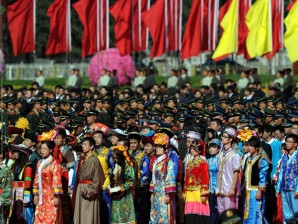
Chinese people wearing traditional dress walk towards the Monument to the People's Heroes at Tiananmen Square during a ceremony to mark China's National Day in Beijing on October 1, 2011. AFP
BEIJING – China’s top leaders marked national day Saturday with an appearance on Tiananmen Square in central Beijing after Prime Minister Wen Jiabao pledged greater “democracy” and rights for the people.
President Hu Jintao, Wen and top Communist Party leaders descended on the vast square and bowed before the monument to revolutionary martyrs, as they marked the 62nd anniversary of the founding of the People’s Republic of China.
In a speech Friday night, Wen pledged to address China’s biggest social issues, including rising inflation, a yawning income gap, unemployment, food safety, corruption, environmental destruction and social injustice.
“We will make great efforts to guarantee and perfect democracy and resolve the problems that most concern the people and that most directly involve their interests,” Wen said in the speech posted Saturday on government websites.
“We will make great efforts to advance the opening and reform and continue to push forward economic, political, cultural and social system reform. We will make great efforts to safeguard social justice, and ensure the people’s democratic rights and judicial fairness.”
But by “democracy”, China’s communist leaders do not mean multi-party competition for power at the ballot box, generally referring instead to discussions within the ruling elite.
During his speech, Wen insisted that the nation would adhere to “socialism with Chinese characteristics,” code for the one-party dictatorship’s refusal to countenance the separation of powers seen in governments around the world.
But, “we must … dare to study and draw lessons from the outstanding achievements produced by every nation of the world and make contributions to the advance of human civilisation,” Wen said.
In recent years, China has witnessed an unprecedented number of street protests often aimed at government graft and the widening wealth gap, problems Wen has earlier attributed to the political system and an over-concentration of power among officials.
In response, he has repeatedly pledged to advance democracy and human rights, even as his government has cracked down on any sign of unrest since jailed dissident Liu Xiaobo was awarded the 2010 Nobel Peace Prize a year ago.
The crackdown further intensified in February, with leading activists and rights lawyers disappearing into police custody without being charged amid anonymous Internet calls for Arab-style protests in China.
Wen’s remarks also come as the nation’s parliament deliberates amendments to the criminal code that would allow police to secretly detain suspects for up to six months without charges and without notifying their families.
Activists and rights group have loudly decried the amendments as a blatant violation of human rights.
China’s crackdown on dissent was likely to continue until at least late next year when a key party congress announces a new leadership, followed by the retirement of Hu and Wen in early 2013, said Willy Lam, a leading China expert at the Chinese University of Hong Kong.
“Wen Jiabao remains a kind of minority in the leadership as far as political reform … he is a voice in the wilderness,” Lam told AFP.
“Wen is determined to persevere until his term is up, but there is no possibility that the collective leadership will make a decision to revive or continue political reform … in terms of facts there has been a retrogression on political reform.”